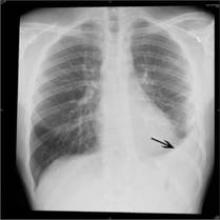Introduction of two specific variations of pneumococcal conjugate vaccine in children no older than 5 years of age can decrease their chances of developing sinusitis and pneumonia, according to a new study published in Pediatrics (Pediatrics 2014 doi: 10.1542/peds.2013-4177).
“Streptococcus pneumoniae is a major cause of pneumonia and sinusitis,” according to Dr. Ann Lindstrand, of the Public Health Agency of Sweden in Solna, and her associates “Although pneumococcal conjugate vaccine (PCV) is effective against invasive pneumococcal disease, its effectiveness against pneumonia is less consistent, and its effect on sinusitis is not known.”
The retrospective, population-based study involved data from three pediatric hospitals in Stockholm County, Sweden. The investigators compared the incidence of sinusitis, pneumonia, and empyema in the years July 2003 to June 2007 with the years July 2008 to June 2012, excluding the year of PCV7 introduction.
The results showed that PCV7 and PCV13 vaccinations led to significant decreases in sinusitis and pneumonia cases for children at or under the age of 2, while a decrease, though less profound, was also noted in cases of sinusitis and pneumonia for children between 2 and 5 years of age.
Following the introduction of PCV7 and PCV13 vaccinations, incidences of sinusitis dropped from 70 cases per 100,000 person-years to 24 cases per 100,000 for children ages 0-2 years (RR = 0.34, P < .001), while incidences for children ages 2-5 years dropped from 25 cases per 100,000 person-years to 18 cases per 100,000 person-years (RR = 0.76, P = 0.06). In cases of pneumonia, children ages 0-2 years saw incidence drop from 450 cases to 366 cases per 100,000 person-years (RR = 0.81, P , .001), while incidences in children ages 2-5 years decreased from 250 cases to 212 cases per 100,000 person-years (RR = 0.85, P = .002).
However, for children ages 5-18 years who received the vaccinations, hospitalizations for both sinusitis and pneumonia increased, albeit marginally. Similar increases were also noted in children who received the vaccines and developed empyema across all three age brackets. The increase in empyema hospitalizations as “not statistically significant,” according to Dr. Lindstrand and her associates.
“Pneumococcal disease is the most important vaccine-preventable disease in children, because it causes most child deaths. Many low- and middle-income countries are implementing PCV vaccination programs,” the study says. “This study adds evidence that PCV vaccine (PCV7 and PCV13) prevents severe sinusitis and pneumonia, with implications for global child survival. Specifically, we are the first to show great effectiveness against sinusitis in children [under] 5 years [of age].”
The authors reported that this study was supported by Stockholm County Council research funds, Foundation Samariten, Sachs’ Children’s Hospital, Swedish Research Council, Swedish Foundation for Strategic Research, Knut and Alice Wallenberg Foundation, and Sven Jerrings Foundation, Furthermore, the Stockholm County Council required that the company chosen to supply the vaccine was to give the county a 5% discount off the vaccine price for enabling an epidemiologic follow-up. Finally, Dr. Lindstrand disclosed that she received financial contributions for participation in two scientific conferences from GSK and Pfizer, with her employer financing the equivalent amount in accordance with Swedish rules for pharmaceutical sponsorship for medical education. She has also participated in one clinical vaccine trial in collaboration with GSK.


